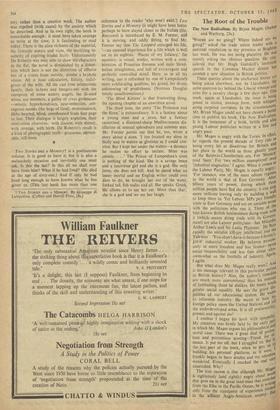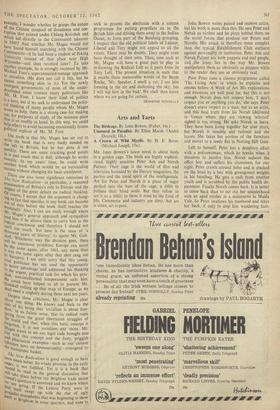The Root of the Trouble
`WHERE are we going? Where indeed are we going?' asked the trade union leader with a national reputation in my presence at Brighton last week. He was not being plaintive. He was merely asking the obvious question. He con- sidered that Mr. Hugh Gaitskell's torrential speech in the Common Market debate has created a new situation in British politics.
These queries about the uncharted Sixties are
being asked elsewhere, too. In Llandudno, the same question lay behind the Liberal whoops and cries for a cavalry charge a few days ago. This week, again at Llandudno, the issue is being posed in muted, anxious form, with whispers along carpeted corridors. In the circumstances,
Mr. Bryan Magee could not have chosen a better
time to publish his book, The New Radicalism. It is the testament of a brisk, brittle and able young Labour politician written at a fine and angry pace. Mr. Magee is angry with the Tories. In effect, he regards the present decade of Tory rule as being every bit as disastrous for Britain and her place in the world as those ghastly Years of the Baldwin-Chamberlain era. For 'Munich' read 'Suez.' For 'two million unemployed' read 'industrial stagnation.' I agree. When it c the Labour Party, Mr. Magee is equally angry: `For instance, one of the most odious regimes in the world is that of East Germany. After fifteen years of power, during which three million people have fled the country, it can stop more millions leaving only by building a w,s, to keep them in. Yet Labour MPs pay friendly visits to East Germany and are on amiable tern's with the politicians who run it. Three of the best-known British businessmen doing trade wit' it (which means doing trade with its ment) are also Labour politicians—Ian Govern Arthur Lewis and Sir Leslie Plummer.' He flatii3, comes to equally the socialist kill-joy intellectualMainkdard`:r-s: Yah-boo "You-shan't-have-it-because-l-have,d got-it' industrial worker. He believes Passt°11- ately in more freedom and less licence—of°re social responsibility and less fuss about whc). owns-what on the foothills of industry. Again' I agree.
But what does Mr. Magee really want? Art
is his message relevant to this particular Peri% in British history? Alas, the author's rem are are much more conventional than his manner of lambasting those he dislikes. He wants mach greater social equality. He sees the grave dis- parities of our educational system. He wants to refurnish industry. He wants to base "•ci foreign policy upon the United Nations and at the underdeveloped areas. It is all praiseworm'i prosaic and against sin! I confess I began his book with symPat*,..t My attention was firmly held by the early P. in which Mr. Magee argues his philosophical aria, moral case. There was a great deal of Porten, tous and pretentious quoting—Freud, for -1 in stance. It put me off, but I struggled on. But o the last part of the book, when he gets on t / building his personal platform, as it were. frankly began to have doubts and my attention wandered. Eventually I reached the end verY unsatisfied. Why? The true reason is that although Mr. Magocebe is righteously (and rightly) angry about mu, that goes on in the great land-mass that stretch from the Elbe to the Pacific Ocean, he is wrin only from the standpoint of experience lintror to the affluent Anglo-American societY. r example, I wonder whether he grasps the nature of the Chinese cesspool of decadence and cor- ruption that existed under Chiang Kai-shek and which led directly to the Communist takeover in 1949? And whether Mr. Magee would not have found himself marching with the Chinese Communists—if he had been a student of Peking University instead of that place near High WYcombe--and then revolted later? To take another example, he is strongly incensed by Mr- Michael Foot's superannuated-teenage approach to socialism. (He does not call it this, but he means something akin to it.) Yet the new y emergent governments of most of the under- developed areas contain many politicians like Mr. M. Foot. I know their kind of politics is a bore, but if we seek to understand the politi- cal thinking of many people whom Mr. Magee Wants to help, there is, a strong case for making use, for purposes of study, of the museum piece that is so readily at hand. In this way, we could help, others to avoid becoming emotionally frozen political replicas of Mr. M. Foot.
The truth is that Mr. Magee has set out to write the book that is very badly needed on the left in Britain, but he has done it too quickly. There are some cracking good points in it and much that is dull, although he writes breezitY. In ten years' time, he could, write another book which would be an outstanding success without changing his basic standpoint. There are also some significant omissions in- 'he New Radicalism—in particular, a reasoned examination of Britain's role in Europe and the impact of the great debate on radical thinking. Of course, I accept that the argument is chang- ing so fast that specifics in any book can become out of date before the book itself reaches the Mr. Also, I can see easily enough where itvir. Magee's general approach and sympathies lead him if he allows them to carry him to the '°gical conclusion and therefore I should not thousand too much. Yet here is the issue of 'a h .s 1 coe ll u s.and years of history,' to quote Mr. Gait- Whichever way the decision goes, there will be enormous problems. Europe can never be the same again, after 1963, any more than , Was the same again after that shot rang out vital politician has not used the opportunity to better advantage' and addressed his thinking tti the urgent practical task for which his prac- Real, non-intellectual temperament suits him- could have helped us all to prevent Mr. auskell rolling up that map of Europe, as we Shall need it mightily during these next ten years. ,Oespite these criticisms, Mr. Magee is clear c000ut one thing. He knows and feels to the Bore of his being that 'socialism is about free- ' in its fullest sense, that its radical roots xe,Ing from the great libertarian struggles of
gowtorld and that, when this basic concept is
geeten, it is not socialism any more. Mtr line with to see our legal code brought. into and 1th this concept and the fusty, priggish inh,. Pharisaical examples—such as our current tb:driall laws on homosexuality—consigned to wastePaper basket. p eeTn much bReadi.. c Iatlsis windygood enough
t htoe have early
Pages is should not fulfilled. Yet it is a book that willt kb c read in the general discussion that e place before my Brighton trade union W0 "au question is answered and we know where
find r'e If the I.abour Party were to itself elf swept up
itAadtst with the rise of ugly xenophobia that was beginning to show ,4eit at Brighton in some quarters, and were to seek to present the electorate with a solemn programme for putting propellers on to the British Isles and driving them away to the Indian Ocean, to form part of the Bandung grouping, I suspect that the old political labels of Labour, Liberal and Tory might not appeal to all the voters. There may be doubts. They might even have thought of their own. Then, men such as Mr. Magee will have a great part to play in re-forming the Radical Left as it parts from its Tory Left. The present situation is such that it recalls those memorable words of Sir Boyle Roche, `Mr. Speaker, I smell a rat; I see him forming in the air and darkening the sky; but I will nip him in the bud.' We shall then know where we are going for certain.
DESMOND DONNELLY







































 Previous page
Previous page